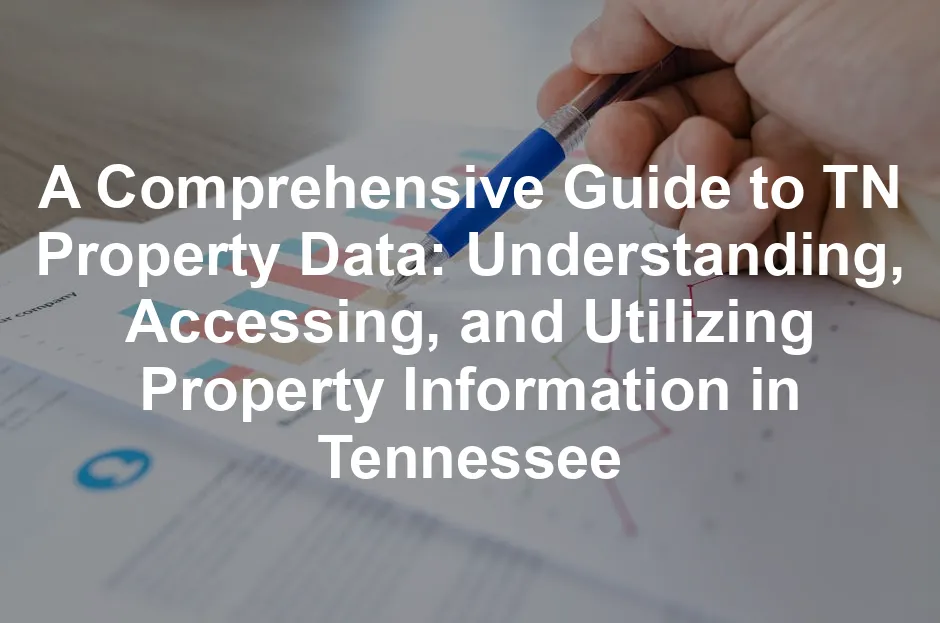Introduction
In the land of Elvis, biscuits, and bluegrass, property data is the unsung hero that keeps the real estate engine running smoothly. Whether you’re a seasoned investor, a curious homeowner, or just someone who loves to browse properties online, understanding Tennessee’s property data can provide you with insights that are as essential as a good cup of sweet tea.
So, what exactly is property data? It encompasses a range of information, including ownership records, tax assessments, and property characteristics. This data can help you make informed decisions about buying, selling, or investing in real estate. With the right information, you can avoid pitfalls and seize opportunities like a pro.
This guide will take you through the ins and outs of accessing and using property data across Tennessee, revealing the hidden gems of information that can help you make decisions that are not only smart but also beneficial. From understanding the types of property data available to learning how to navigate various resources, we’ll cover it all.
Imagine this: you’re considering purchasing a charming little house in Nashville. You want to know if it’s priced right or if the neighborhood is on the up and up. Enter property data! It’s like a treasure map, leading you to the vital info you need to make the best choice.
So, let’s roll up our sleeves and jump into the world of TN property data! Get ready to discover how to utilize this essential resource to not only enhance your property journey but also sprinkle a bit of joy in your real estate adventures. Whether you’re hunting for your dream home or eyeing that investment property, understanding TN property data will be your trusty sidekick along the way.

Summary
In this article, we’ll explore the significance of property data in Tennessee, including what it encompasses and why it matters. Property data includes various types of information, such as ownership records, tax assessments, and property characteristics, which are crucial for property buyers, sellers, and investors.
By understanding this data, you can make informed decisions that align with your goals. The resources available for accessing property data include county websites and state databases, which often provide user-friendly tools for searching property information. For example, Williamson County offers a property search tool that allows users to access property assessments, deeds, and tax records with just a few clicks.
You’ll learn about the different types of property assessments, including real and personal property data, and the role county assessors play in determining property values. Assessors are responsible for ensuring that property assessments reflect fair market values, a vital aspect of property taxation in Tennessee.
Additionally, we’ll touch on the importance of Geographic Information Systems (GIS) in property data management. GIS technology helps visualize property data, making it easier to understand spatial relationships and trends. However, it’s essential to keep in mind the limitations regarding accuracy and legal use when accessing property data.
By the end of this guide, you’ll be equipped with the knowledge to leverage TN property data for your personal or professional needs. With the right tools and understanding, you can navigate the real estate landscape in Tennessee like a seasoned pro, turning property data into your secret weapon for success.

Understanding TN Property Data
What is TN Property Data?
Property data refers to a treasure trove of information about real estate. It includes ownership records, tax assessments, property characteristics, and more. Think of it as the behind-the-scenes pass to the property world.
Ownership records tell you who owns what. Tax assessments reveal how much property taxes you might pay. Property characteristics provide details like square footage, number of bedrooms, and amenities. Together, this data forms the backbone of real estate transactions.
Why does this matter? Well, for property buyers, it’s essential. You wouldn’t buy a car without checking the vehicle history report, right? The same goes for homes. Property data helps you assess whether a listing is priced fairly.
For sellers, it’s equally critical. Accurate data can help set a competitive price. Investors, on the other hand, use property data to identify trends and opportunities. Knowledge is power in real estate, and TN property data serves as your ultimate guide.

Types of Property Data in Tennessee
Real Property Data
Real property data offers insight into land and buildings. It includes information about size, location, zoning, and any improvements made. Want to know if that charming cottage has a swimming pool? This is the data to check.
For a deeper dive into real estate investing, check out The Complete Guide to Real Estate Investing. This book is perfect for anyone looking to expand their knowledge and make smarter investment decisions.

Personal Property Data
Personal property data deals with assets not permanently attached to land. Think of equipment, machinery, and vehicles. This data is crucial for businesses or individuals who want to establish their assets for tax purposes.

Assessment Data
Assessment data indicates how property is valued for tax purposes. It’s like the report card for your property’s worth. County assessors analyze market trends, property features, and sales data to arrive at these figures. The assessed value directly impacts your property taxes.

The Role of County Assessors
County assessors are the unsung heroes of property data management in Tennessee. They are responsible for ensuring that properties are accurately assessed for taxation. This involves discovering, listing, and valuing properties, maintaining ownership records, and preparing tax rolls.
Accurate assessments are vital for fair taxation. If your property is undervalued, you might pay less tax, but you may also face issues when you sell. Conversely, overvaluing can lead to higher taxes and unhappy homeowners. County assessors strive to strike a balance, ensuring everyone pays their fair share.
In short, county assessors keep the property data engine running smoothly. Their work ensures that property taxes reflect the true value of real estate, benefiting both the county and its residents. So, next time you ponder property data, give a nod to your local assessor!
Online Resources for Property Data
When it comes to hunting for property data in Tennessee, county websites are your best friends! Each county offers unique tools to search for property information.
For example, Williamson County provides an easy-to-navigate property search tool. You can access assessments, deeds, and tax records with just a few clicks. Want to check it out? Here’s the link to Williamson County’s Property Data Search.
Moving over to Davidson County, their property search lets you dig deep. You can search by owner, address, or parcel ID. This feature is perfect for those eager to get the scoop on Nashville properties. Curious? Check out the Metro Nashville & Davidson County property search here.
Let’s not forget Knox County! Their property records are accessible online, making it simple to find vital information about properties in the area. However, keep an eye out—sometimes their system is under maintenance. You can visit Knox County’s property records here when it’s up and running.
Lastly, Coffee County offers GIS maps and data for public use. While they caution about data accuracy, it’s a great resource for visualizing property information. Explore Coffee County’s resources here.
For those looking to enhance their property management skills, consider grabbing a copy of Property Management Toolkit. This resource is excellent for both new and seasoned property managers looking to streamline their processes.

How to Conduct a Property Search
Ready to search for property data? Here’s a step-by-step guide to help you navigate like a pro!
- Choose Your County: Start by selecting the county you’re interested in. Each county has its own website with unique tools.
- Select Search Criteria: You can search by owner name, address, or parcel ID. This flexibility makes it easier to find what you’re looking for.
- Enter Information: Fill in the relevant fields with accurate information. This is where you can shine—be precise!
- Review Results: Click “Search” and watch the magic happen! Results will appear, showing you property details, assessments, and more.
- Dig Deeper: Click on individual properties to access even more information, such as tax records and ownership history.
Screenshots can be a lifesaver! They help clarify steps, especially for visual learners. While we can’t include them here, don’t hesitate to take a peek at the county websites. They often have guides or tutorials to assist you further.
To keep your home in check, consider using a Home Inspection Checklist. This handy tool ensures you cover all bases when buying or maintaining your property.

Geographic Information Systems (GIS)
GIS technology is the superhero in property data management. It helps organize, analyze, and visualize property information, painting a clear picture of your property landscape. Think of it as mapping out your treasure hunt!
Counties in Tennessee utilize GIS tools effectively. For instance, Coffee County offers GIS maps for public access, allowing you to visualize property boundaries and neighborhood features. Just remember, while these tools are helpful, they come with disclaimers about data accuracy.
In Williamson County, the GIS system assists in property assessments and planning. It’s a handy tool for developers and investors alike. By accessing these maps, you can uncover valuable insights about property locations and their surroundings.
With GIS, property data transforms from a jumble of numbers and names into a visual playground. It allows you to see trends, analyze neighborhoods, and make informed decisions about your property journey. So, embrace GIS technology and navigate the property landscape like a seasoned explorer!

Understanding Property Taxes and Assessments in Tennessee
Overview of Property Taxation
In Tennessee, property taxes are calculated based on assessed values set by local county assessors. They determine how much a property is worth in terms of taxation. Each county uses a combination of factors to establish these values, including property characteristics and current market trends.
Local governments play a significant role in this process. They establish tax rates that are applied to the assessed values. These rates can vary widely from one county to another. It’s essential to understand that while the assessors evaluate properties, the tax rates are set by elected officials, making it a collaborative effort between different branches of local government.
Are you new to real estate investment? Real Estate Investing: Market Analysis, Valuation Techniques, and Risk Management is an excellent read that provides insights into the financial side of real estate, helping you understand how to navigate taxes effectively.

Navigating Property Tax Records
Finding and interpreting property tax records can seem daunting, but it doesn’t have to be. Start by visiting your county’s property assessor’s website. Most counties in Tennessee offer online tools where you can search for property data by owner name, address, or parcel ID.
Once you obtain the records, look for key details like assessed values, tax rates, and payment history. Understanding these elements is crucial. Staying current on your property taxes and assessments ensures you won’t face penalties or unexpected bills. It also helps maintain your property’s value and appeal, especially if you plan to sell in the future.
For a comprehensive overview of home buying, don’t miss Home Buying for Dummies. This book simplifies the process and helps you avoid common pitfalls.

Common Questions about Property Taxation
Property tax appeals and exemptions often generate many questions. Homeowners frequently ask, “How can I appeal my property tax assessment?” The answer typically involves contacting your local assessor’s office and following their process for filing an appeal. Keep in mind that you usually need to provide evidence to support your claim.
Exemptions, such as those for veterans or the elderly, can significantly lower your tax burden. Check with your county to see what’s available. Always stay informed; knowledge about property tax options can make a positive impact on your finances.
For those interested in the nitty-gritty of real estate investing, The Book on Rental Property Investing is a fantastic resource that dives deep into the mechanics of becoming a successful landlord.

Data Accuracy and Reliability
When it comes to TN property data, accuracy is everything. Imagine buying a house only to discover it has more issues than a soap opera. That’s why relying on precise property data is crucial. However, there are pitfalls. Data can be outdated or incorrectly recorded. A property that appears to have a clean history might have hidden liens or zoning issues. Always consult official records. They serve as the gold standard in verification.
Official records from county assessors or state databases provide reliable information. These records are regularly updated, ensuring you have the most accurate data at your fingertips. Relying solely on third-party data can lead to costly mistakes. So, when in doubt, go straight to the source. Remember, in real estate, knowledge is your best friend.
To help you manage your property effectively, consider investing in a Real Estate License Exam Prep book. This guide will prepare you for the licensing process and enhance your understanding of real estate laws.

Legal Use of Property Data
Using TN property data comes with legal responsibilities. Don’t assume you can use this information for commercial purposes without a care in the world. The law lays down strict guidelines regarding the use of property data. Commercial use without permission might land you in hot water.
Consequences can range from hefty fines to potential lawsuits. It’s essential to familiarize yourself with these restrictions before you start using any property data for business. Always check the terms of use provided by the respective counties or databases. Respecting these legal boundaries keeps you safe and sound in the property data landscape.

Conclusion
In conclusion, TN property data is a powerful resource that can unlock the door to informed real estate decisions. Whether you’re looking to buy a home, invest in property, or simply satisfy your curiosity, knowing how to access and interpret this data is crucial. As you navigate the world of Tennessee property information, always remember to cross-reference data with official records to ensure accuracy. With this guide in hand, you’re ready to take on the property market with confidence!
FAQs
What types of property data are available in Tennessee?
Various types include real property data, personal property data, assessment records, and tax information.
How can I appeal my property tax assessment?
To appeal your property tax assessment, contact your local assessor’s office. They will guide you through the process.
Where can I find the most accurate property data?
For the most accurate property data, refer to official county assessor websites and state resources.
Is property data publicly accessible?
Yes, property records are generally public, though there may be limitations on access to certain details.
Can I use TN property data for commercial purposes?
Using TN property data for commercial purposes is restricted. Ensure you understand the legal limitations before proceeding.
Please let us know what you think about our content by leaving a comment down below!
Thank you for reading till here 🙂
All images from Pexels




